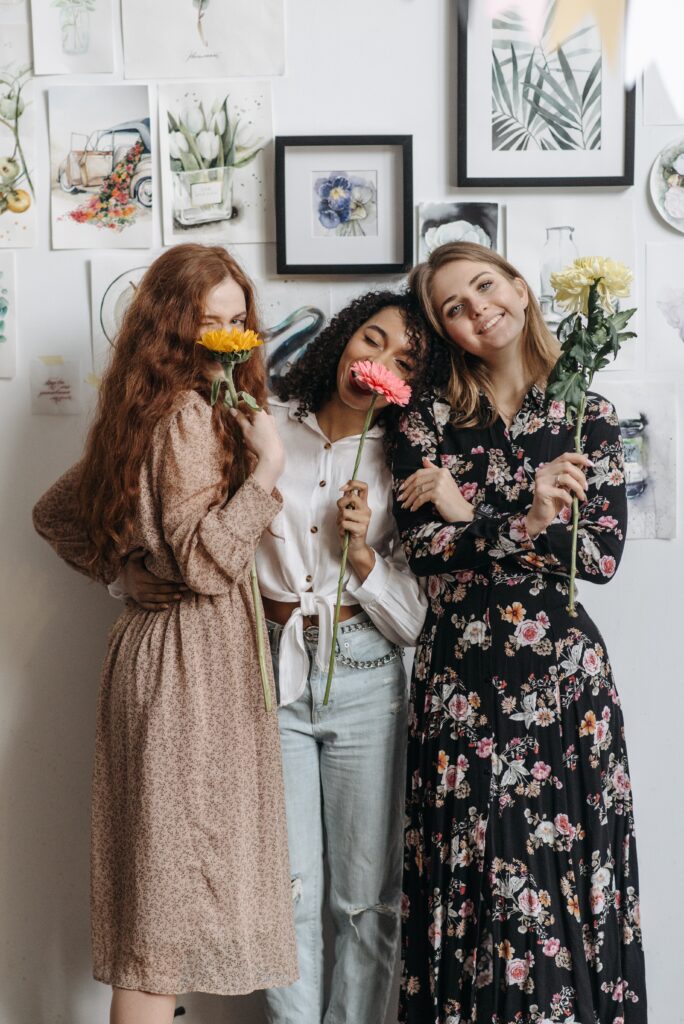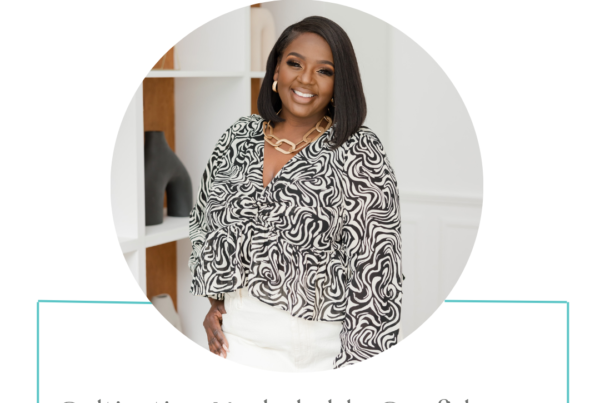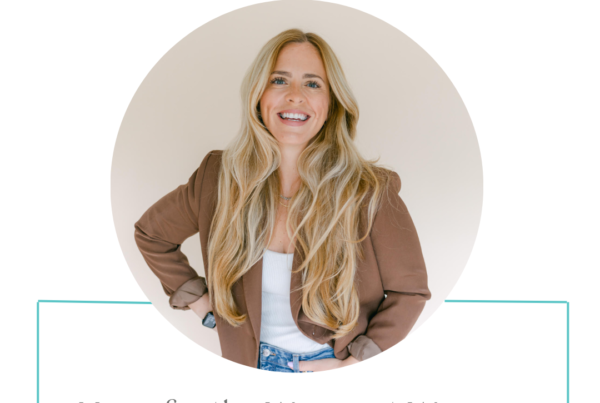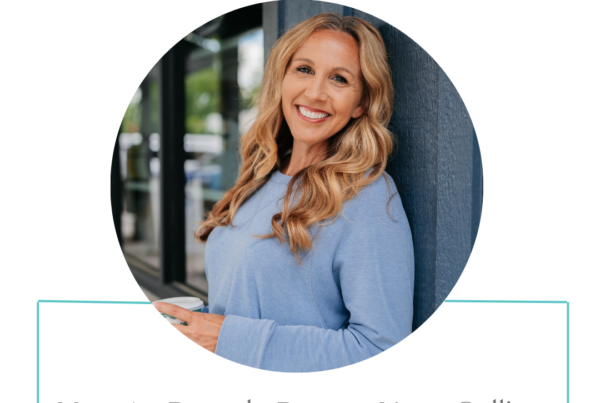Bailey T. Hurley, author of “Together Is A Beautiful Place” is everyone’s favorite community cheerleader. She encourages women to pursue a faithful relationship with God so they can build fruitful friendships in their corner of the world. Are you lonely? Do you struggle to find the real friends you long for? Be encouraged that it is possible to grow healthy friendships, starting now. Bailey helps us identify what makes a true friendship, tackles lies and false expectations about what it takes to build lasting friendship and offers wisdom and practical tips for healthy friendship rhythms. We hope this conversation gives you the inspiration to cultivate positive and life-giving friendships in your own life. Visit the show notes at wonderfullymade.org for noteworthy links and more information.
—
Watch the episode here
Listen to the podcast here
Together Is A Beautiful Place: Cultivating Life-Giving Friendships With Bailey T. Hurley
Bailey, welcome. We are so glad that you are part of our community here at Wonderfully Made. As you and I were connecting, I realized that it goes back many years. Will you share a little bit more about that?
Yes. I went to Pepperdine University, and there were Wonderfully Made events happening when I was a student. I have been following Wonderfully Made for a very long time. When we started to connect by having some articles on the website and the blog, it felt full circle because I would have never imagined that this would be the way we would be exchanging and engaging with each other.
How are you doing? I’m so excited to talk to you.
I am doing well. Tuesdays are my fun day. I have some help with the kids so that I can focus on work stuff. I’ve got that extra drive and energy on Tuesday mornings.
Bailey, we have been loving the articles that you have so generously been sharing over on our blog at WonderfullyMade.org. They were beautiful articles. You are a gifted writer. You are an author and a speaker. It is your passion to invite women to creatively build rooted community in their corner of the world. I love that so much. You believe that one of the best ways to demonstrate God’s love is in community and through laying down our lives for a friend. You write about this in your book, Together is a Beautiful Place. How did this topic become so important to you personally?
I grew up in an incredible community. I don’t think at the time I would have recognized it for what it was other than feeling full, having a large friend group that loved Jesus, was passionate about using their gifts to serve the Kingdom, and then having a lot of fun. I enjoyed that community. I went to college expecting it to be that and more.
This is our first-time college where you have to navigate multiple responsibilities. Maybe you haven’t learned time management. I remember I read an article someone did about loneliness, and I can’t pinpoint it. It was someone trying to identify why Millennials are the loneliest generation to date. One is that we have always had our schedule so packed that, all of a sudden, you become a young adult, and all to do is work and work or do, and you never slow down to have relationships.
One of the challenges to creating long-lasting friendships is that we often give up when it gets hard. Maybe that is something you have never pinpointed or you would admit to. Click To TweetWhen I came to college, I was pretty persistent. I want to be a good student. I finished assignments probably weeks in advance. I was always doing schoolwork. I had an on-campus job, which was the best but I feel like I was filling my schedule with things to do. I wasn’t building in time to connect, even being a part of a sorority, going to events, hosting Bible studies, and joining clubs. Those are all wonderful things but if I wasn’t relating to anyone while I was doing them, there is a difference between being with people and around people. After I left college, I felt pretty disappointed.
By my junior year, I had hit a mini-depression where my parents were worried about me. I was worried for myself. I didn’t know what to do. Having left college, I came to Denver again, not knowing anyone. I was in the middle of like, “I don’t want to do community the way I had done it in college.” There was a lot I had to own up to but I also know that maybe friendships won’t look the same way they did when I was in high school. Where’s the happy middle ground? I started this new journey of, “What does adult friendship look like, and how do you create the community you want?”
From that point on, I have been in Denver for many years and felt the different strategies and things I have learned. I have built this wonderful, beautiful community that is founded more on maybe God’s vision or God’s expectations for the community rather than the world’s expectations for community, which often relies on television shows or social media to define what a quality friendship looks like. When the Bible says that friendship is usually a lot more of than laying down your life relationship.
I’m excited that we are diving into this topic of friendship. It is at the forefront of so many of our minds. I love that you have experienced this. You have been disappointed by the lack of community in your life, and you have chosen to intentionally seek out and create community. That takes effort and desire. Why do you think girls and women find it so challenging to maintain long-lasting friendships, and how can we overcome this?
One of the challenges to creating long-lasting friendships is that we often give up when it gets hard. Maybe that is something you have never pinpointed or you would admit to. If you look back on it, anytime a friend asks more of us than we are willing to give, we tend to back off. Once you have identified and discerned that this is someone who you could go all the way with that, it is worth making those many sacrifices to make sure you are spending time together, being consistent, and being a faithful friend.
I often like to point to Facebook events for ruining our commitment to friendships. For the first time, we had events getting scheduled in plan. There is the yes button, no button, and maybe button. I’m like, “Maybes have destroyed us because we are half in, half out.” If something better comes along, we are willing to not show up. If we are feeling socially anxious or being lazy, we say, “I didn’t commit. I’m not going to go.” Those are the things that will ruin opportunities of having a life, giving long-lasting friendships is this half in, half out mentality, giving up when it gets hard or asks too much.
Do you also think that the seasons of our lives can play a part in this? Say one friend goes on to get married, she has children, and the other friend is single, her story looks very different from her best friend, and life is different for each of them. How do we wrestle through this when our friends, maybe in years prior, were in school together? We all did the same activities and things versus being single, and we didn’t have boyfriends. What does it look like to also invest in friendships over the long haul through the different seasons of our lives?
It is natural to have your friendship shift when you are entering into different seasons of your life. We are looking for support of, “I’m a new mother. What am I doing.” You are going to be looking for other new mothers. I started a new job and moved to a new city, you are going to be looking for people who are navigating the same things but that doesn’t mean you can’t hold onto that friend that is willing to adapt to the changes.

Life-Giving Friendships: What does adult friendship look like and how do you create the community you want?
One of the things I talk about in the book that I like is the idea of nostalgic friendship versus adaptive friendship. Nostalgic friendship is putting your friend in a box and not allowing them to change from the way your friendship has always been because you are nostalgic about it. You loved who you were in college. You loved how the relationship functioned at that season in your life.
Now you are young adults, you moved to different places, and the person is changing, you don’t like that. You might say, “This is a friendship that is going to lose touch because I can’t let go of the way it used to be.” The friends that go a long way are your adaptive friendships. Those are people who are willing to shift, change, learn and say, “It is okay for you to be different and grow because I’m willing to know this person, too.”
I have had an incredible friendship that I met my first year here in Denver. She was a senior in college, and I was just out of college. In that time, I feel like my timeline exponentially took off, meaning I’ve got married within that year, and we ended up finding out we were pregnant early. Here I am, years later, with three kids and living in a house and all sorts of things, and she is still in a season of singleness.
We just had a conversation because she is my star example of what it looks like to be an adaptive friend because she has come along and celebrated all of these milestones. We have had our moments of things that are different and going to be interesting to navigate but we were never willing to say we weren’t going to try.
It is beautiful looking back on having her thrown baby showers, us having celebrated her work promotions, and then all the things in between. We honestly are probably stronger, even though we don’t share the same season of life. I feel we have been able to have the capacity to celebrate each other’s wins, feel sad for each other’s losses, and then also still sit on the couch, watch television, and eat junk food.
You put great language to that. I love how you categorize them as nostalgic friendships, hanging on to how things used to be, not letting them change, and not giving your friend room to grow and pivot, and then these adaptive friendship. You are right. For us to have these long-lasting friendships that endure through all the seasons of our life, we do need to be adaptable and make sacrifices. It can look like laying our own desires and wants away to celebrate our friend or to come alongside her. I love that so much. Thank you for sharing. What do you think some of the lies and false expectations are that we have about friendship?
The first one I want to share is the pressure to have a best friend. We carry it with us from childhood, like round days that you have to have a best friend or there is something wrong with you. I explored this when I had been in for a couple of years in Denver. I was walking around the park with a friend. We were pretty good friends but she was honest and said, “I feel I don’t have a best friend.”
That meant that she was lacking something in her life. Over time, I have learned that the beauty of friendship is that you can have a friend that’s the best at something. You can go to different friends for different emotional needs and social needs, and they can be the person that’s best at listening to your pain, stories or joy. You can have a friend that’s the best at doing all the fun outside activities, making food, hosting gatherings with you, and all the different things.
The beauty of friendship is that you can have a friend that’s the best at something. Click To TweetThe pressure is off, and it also takes the pressure off of somebody else. Even if you think someone is your best friend, they might not see it that way. Instead of putting all of your eggs into one basket, demanding and asking them to be this person for you, relieving that pressure to say, “I love you. You are valuable to me but I don’t have to come to you to receive every single thing that I need.” That is not healthy in any relationship because we should turn to Jesus to meet all of our needs.
What that best friend relationship does as adults are put people in a box and say, “You have to be everything to me.” When they disappoint you or let you down, there is more sadness and pain that comes from that that could have been avoided. It is important that you are enjoying and celebrating all the different people in your life.
The second thing I wanted to say about a lie for friendship, especially female friendship, is that it is 50/50 that your friendships are an equal share because it is not true, which sounds hard because we all want friends who reciprocate at the exact same energy and output that we are giving. In reality, some days, friendship is 20/80. Some days, it is 40/60. Some days it is flip-flopped, where your friend is giving more to the relationship than you had the capacity to give.
Understanding that friendships can fluctuate with our time and attention is okay. It is okay when someone is not maybe putting in as much as you are in the moment. Do I think reciprocation is important? Yes. Do I think it needs to be equal all the time? No. Being able to watch yourself and give people second chances is so important. I always think about dating relationships because they are so close to this friend-seeking, friend-relationship dynamic.
I hear women all the time give guys second chances for things. “He doesn’t text all the time but I’m still into it. He’s not good at following up on things or scheduling dates with me. I have to initiate but I will give him ten more chances.” With girlfriends, we don’t do that. We say, “She never texts back when I text her. I’m done with that friendship.” We need to be more open-handed to give people the benefit of the doubt. It is okay if you are not always giving the exact same as your friend and have grace for those second chances.
Bailey, I feel like I’m having some a-ha moments right here with you. These are so good. There is that unspoken pressure we live with from the time we are little girls to have this best friend. She is always going to be there and show up for us perfectly for the rest of our lives. It can be this even exclusive friendship.
Sometimes even girlhood or adult best friend friendships can be exclusive. I don’t think that’s always honoring or inviting to other people. I love what you said about, “You can have your friend who’s the best at this.” I have my friends who are the best at my surfing buddies, the best at adventuring, the best at having a heart-to-heart or praying with me.
That is this more expansive view of friendship because you are right. No one person, male or female, should be our everything. I love what you said about reframing the way that we view our friendships and celebrating the different gifts and blessings that our various friends bring to our lives. It ends up cultivating a much deeper tapestry of community rather than a one-on-one exclusive friendship that doesn’t invite other people in.

Life-Giving Friendships: It is important that you are enjoying and celebrating all the different people in your life.
I like this idea of reciprocity. You are right. I think about my friendships and oftentimes, they are not 50/50. Maybe I’m putting in more effort with this friendship or there is a friend who’s putting more effort in with me than I am with her. That is another a-ha moment. You have some great wisdom in friendship. Thank you so much for sharing.
Let’s talk about friendship breakups for a second. Friendship breakups are a real thing and they happen. Sometimes there is drama and tears involved, and it is heart-wrenching. They are not necessarily breakups but they dissolve, evaporate or someone goes out of your life who is once a very instrumental part of your life. Do you have any wisdom to help us navigate these friendship breakups?
For the ones that naturally dissolve, the aftermath is maybe some shame or regret, “I wish I should have done more. I wish I had reached out more. I’m sad that I lost touch with that friendship.” To debunk that, it is okay. Let go of that shame because friends come and go, and it is completely natural and normal. It is not on you to have done more for the friendship. It is okay to remember it for what it was and move forward.
For the ones that are more drama, which is truly the one that is probably the toughest, sometimes I have had a friendship breakup, and I’m left with my mouth open of, “What just happened.” This feels like it came out of the left field. I did not know this person felt this way, and then it exploded in my face. Some overarching recommendations are to look at it in two ways. One is to treat people the way you want to be treated as well as try to live your best to be above reproach. Typically, those friendship breakups do cause drama, and people want you to pick sides.
I want to follow through with this in a way that if anybody on the outside were to look in on the situation, they couldn’t point fingers at anything I did to have added lies or manipulations. As they communicate as quickly as possible, if you sense there is some ghosting going on or they are acting differently, instead of taking it to other friends, call them and say, “I have noticed this behavior. Is there something going on that I’m not aware of? I would love the opportunity to apologize while we are over the phone or in-person because I want to get it out in the air.”
Silence is a friendship killer if the friendship is not already dead. Leaving room for assumptions to build up is going to harm and add conflict to the conflict. Right away, it is calling someone and humbly being like, “What is going on? What have I done? Please, I want to be made aware because where I’m sitting, I don’t see it. I don’t know what’s going on but you do. Can you let me in?”
Listening and apologizing that you need time saying, “Let me be praying about this or think on this. I will get back to you on Tuesday at 2:00 PM,” being specific with where you stand and from there, trying to work towards reconciliation. That doesn’t mean that you forget what’s happened but you are working towards forgiveness.
These people could still be in your social circles, at your workplace, in your Bible study or at your church, and you want to have done everything possible to make it right, so you can live at peace with all people and not be anxious about being in the same social circles or making it uncomfortable for friends who want to invite you to their birthday but they know that you aren’t friends anymore.
Friends come and go and it is completely natural and normal. It is not on you to have done more for the friendship. It is okay to remember it for what it was and move forward. Click To TweetThey are like, “How do I invite one person and not the other person? Will they cause drama if they both come?” It is reaching that reconciliation to the point where you have had opportunities to be heard, apologize, and forgive. You only owe that person for your piece of the conflict. Everything else is for them to work out, whether they choose to forgive you or not, that is on them.
It makes me think of that verse in Colossians to clothe ourselves with humility and kindness if we can remember to do that even when friendship gets hard, to humble ourselves, ask for forgiveness when it is needed, and live more authentically. Bailey, what are some of the healthy friendship rhythms you think women can start practicing which will help us invite better friendships into our lives?
Here is one idea for you that you can start. That is to pick up your phone and call a friend. There was research done in 2020 at the University of Texas in Austin. They found that people who took ten-minute phone calls a few times a week had their loneliness decreased by 20%, which is a pretty high percentage. People get overwhelmed thinking, “If I pick up the phone, I’m going to have to talk for an hour.”
It can be those little deposits every day that add to feeling connected. My rhythm is to go ahead, find ten minutes in your schedule, maybe while you are eating lunch, you are on a walk or you are driving and call someone, chat and say, “How is your day? I have been thinking about you. How can I pray for you? Let’s talk later.” Nothing super big.
That’s so good. I always say to myself, “Be a phone call in a sea of texts.” We are always getting text messages, boxers, and DMs. Let’s bring back a good old phone call.
I love this, and you should make a sticker or something.
With a meme?
Yes.

Life-Giving Friendships: Friends come and go and it is completely natural and normal. It is not on you to have done more for the friendship. It is okay to remember it for what it was and move forward.
Let’s do it. Let’s bring back the phone call. I love it. I like to do that. I like to have a couple of friends to do that with and surprise them. It is fun. I always walk away feeling connected. The thing about text is that you can’t have a pulse on how your friend is doing. We have succumbed to emojis to express our emotions rather than the tone of voice and actual human-to-human verbal communication.
I also surprise my friends. The more you do it, the more they are also going to get the rhythm and be trained up to pick up their phone because they also know you are not calling to steal two hours of their day. They are like, “I’m going to pick up because I know that she’s calling to check in, and it is great.” Even your friends might be a little surprised at first but over time, they will be like, “This is normal, and I love it. I look forward to it.”
Here’s the thing, going back to the reciprocal aspect of it is not always 50/50, you may be the friend that is calling your friends, and they might not call you back. They might be texting you back but that’s okay. We can show up and invest in the friendships that we want to. I love that. It is a powerful principle. We need to bring it back and start doing it more. Bailey, I’m curious if you have any thoughts before I ask you our last question about the role social media has played in friendships.
That is a great question because it is good and bad personally because I haven’t looked into too much research on this subject yet, even though I know that it is out there. The benefits are that it genuinely does make you feel like you are connected to people’s lives that you are checking in. I have friends that don’t have social media at all, and it is out of sight, out of mind.
All of a sudden, I will think, “I haven’t heard anything. I haven’t seen a picture of their kid in a while. What are they doing? How are they doing? I miss them.” I wish I knew what was happening on a regular basis. The negative impact has been researched by Kat Vellos. She wrote a book called We Should Get Together. She found out that with social media, she didn’t feel like she needed to check in with people as often because she feels like she already was.
You are passively checking in on people, so you don’t ever take the step to call them and get coffee or call a long distant friend to see how they are doing. You are like, “I already know,” and leave it there. There is a benefit to staying in touch, and then there is the negative of, “I’m too in touch. I’m not going to go the extra mile to reach out.”
Bailey, you articulated that dilemma so well. If you could go back and give your younger self some words of wisdom, how old would she be, and what would you say to her?
She should be twenty. She should be sitting in her dorm room, probably crying in the dark. I would tell her, “Stop wishing things were different and go make things different.” I once heard loneliness described as the disparity between your expectations and reality. The truth was, in college, I had a plethora of friends. I had so many opportunities to invest, connect and make those relationships tangible, solid, and real.
I was so turned off by my expectations that they were going to be better. Better how? I don’t know. I was so misguided, and my expectations weren’t aligned with what my reality was, so I felt like nobody got me. Nobody was a true friend. Nobody understood what I needed. I have learned now I could have asked or I could have communicated how I felt, gone out and said, “I’m going to make this different. I will change my expectations. I will figure out a way to bridge the two so that they better meet the reality.” My expectations are being met or the experience is exceeding them. That’s what I would tell myself.
I honestly still wish I would have gone back and known those things sooner. If you are reading, hopefully, you can change things if you are feeling lonely in your social circles. If you are at college and you are feeling, “I don’t know where I fit in,” to say, “Let me understand where my expectations are and how can I maybe flip them around or change them?” Find that friendship is right in front of you. It is available, and it is right there. God never gets the address wrong. He never gets it wrong, where he’s placed you. There are people there that are waiting to be friends with you. I hope you feel encouraged.
That’s great wisdom. As always, we invite you to share this episode or an episode that was meaningful to you with a friend, so you can invite her to be a part of our growing community here at Wonderfully Made. Thank you, everyone, for reading. Bailey, it is so great to reconnect with you.
It is so wonderful. Thank you, Allie.
Important Links
- Bailey T Hurley
- Together is a Beautiful Place
- We Should Get Together
- https://Smile.Amazon.com/Together-Beautiful-Place-Finding-Keeping/dp/1641583169/ref=sr_1_1?crid=173CRKYVB80GU&keywords=bailey+t.+hurley&qid=1648667743&sprefix=bailey+t.+hurley%2Caps%2C135&sr=8-1
About Bailey T Hurley
 Bailey T. Hurley is everyone’s favorite community cheerleader. She encourages women to pursue a faithful relationship with God so they can build fruitful friendships in their corner of the world. She has written on the topic of friendship and faith for publications like She Reads Truth, Salvation Army’s Peer Magazine and Grit and Virtue. She also loves podcasts! You can find her chatting all about friendship on Sally Clarkson’s podcast Life with Sally, Kristin Schell’s podcast At the Turquoise Table, and a dozen more.
Bailey T. Hurley is everyone’s favorite community cheerleader. She encourages women to pursue a faithful relationship with God so they can build fruitful friendships in their corner of the world. She has written on the topic of friendship and faith for publications like She Reads Truth, Salvation Army’s Peer Magazine and Grit and Virtue. She also loves podcasts! You can find her chatting all about friendship on Sally Clarkson’s podcast Life with Sally, Kristin Schell’s podcast At the Turquoise Table, and a dozen more.



